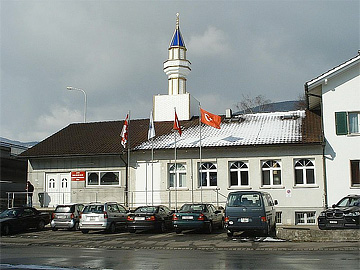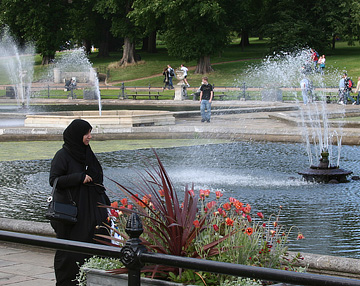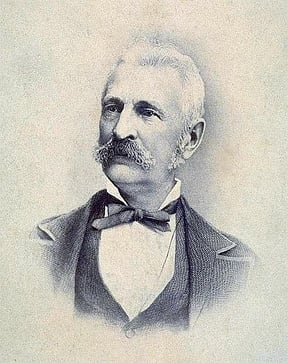I have been watching for some time the move in Europe to limit religious liberty for the sake of, well, liberty. At least that’s what they’re saying in Europe: limit liberty for the sake of liberty. Hmmm.
 My attention was gripped last year when Switzerland voted in a national referendum to modify the Swiss Constitution to ban the building of minarets on buildings. Existing minarets in four Swiss cities would not be affected. But no new minarets could be constructed. Those who supported the ban argued that the minaret, though usually found on Islam mosques, was not an essential part of Islam, and thus there was no issue of religious freedom. But supporters certainly used fear of Muslims as a powerful weapon in their effort to pass the referendum. In spite of the fact that the Swiss government and most religious bodies opposed it, the referendum passed with 57.5% of voters approving. (Photo: A minaret on a mosque of a Turkish cultural association in Wangen bei Olten.)
My attention was gripped last year when Switzerland voted in a national referendum to modify the Swiss Constitution to ban the building of minarets on buildings. Existing minarets in four Swiss cities would not be affected. But no new minarets could be constructed. Those who supported the ban argued that the minaret, though usually found on Islam mosques, was not an essential part of Islam, and thus there was no issue of religious freedom. But supporters certainly used fear of Muslims as a powerful weapon in their effort to pass the referendum. In spite of the fact that the Swiss government and most religious bodies opposed it, the referendum passed with 57.5% of voters approving. (Photo: A minaret on a mosque of a Turkish cultural association in Wangen bei Olten.)
Increasingly, the watershed issue in Europe has to do, not with mosques, but with burqas and niqabs, garments worn by some Muslim women that mostly or completely hide their faces. (Burqas completely cover faces; niqabs cover all the but eyes.) A recent USA Today article announces: “Burqa bans grow fashionable in Europe.” Here are some of the facts:
• In April 2010, a bill to make it a crime to wear a face covering passed unamimously in the lower house of the Belgium parliament. It is likely to become law soon.
• In May 2010, the French cabinet approved a ban on face-covering veils worn in public. If the National Assembly votes positively, it will be a crime for a woman to wear a burqa or niqab. The penalty will be a fine of $186 and required attendance in a citizenship class (!).
• According to USA Today, “Lawmakers in Germany, Denmark and the Netherlands voice support for
banning veils but have been held back by . . . legal concerns.”
 Why is Europe moving to ban the wearing of face-coverings by Muslim women, many of whom have chosen to do this as an expression of their faith in Allah? One stated concern is security. Police need to be able to identify people in public, explains a co-author of the law in Belgium. (Photo: I took this picture in Hyde Park, London, in 2007. The woman is not wearing a face-covering, but rather a chador that covers her body completely but not her face. I did see several burqa-wearing women in Hyde Park, but was not able to photograph them.)
Why is Europe moving to ban the wearing of face-coverings by Muslim women, many of whom have chosen to do this as an expression of their faith in Allah? One stated concern is security. Police need to be able to identify people in public, explains a co-author of the law in Belgium. (Photo: I took this picture in Hyde Park, London, in 2007. The woman is not wearing a face-covering, but rather a chador that covers her body completely but not her face. I did see several burqa-wearing women in Hyde Park, but was not able to photograph them.)
But motivation for banning face coverings is motivated by more than worries about security. Here are some quotations from the USA Today story by supporters of the bans:
“It is really dangerous for our values in Europe,” [a Belgian lawmaker] says.
“There are extremist gurus out there and we must stop their influence
and barbaric ideologies,” says Communist Party lawmaker André Gerin.
“Covering one’s face undermines one’s identity, a woman’s femininity
and gender equality.”France banned all religious symbols, including large crosses and head
scarves, from public classrooms and buildings in 2004. The draft law
states that the French republic’s founding values of liberty, equality
and fraternity are at stake — that a face covering undermines a woman’s
liberty by keeping her separate from society, violates fraternity by
excluding others because it hides her face, and undermines gender
equality by keeping women in an unequal position.
So, it seems, that many would argue in favor of a limitation on religious liberty on the basis of the need for liberty.
Many religious leaders, including many Christians, have spoken out against the face-covering bans. Not only are these leaders concerned about the denial of religious liberty for Muslim women, but also they are reading the handwriting on the wall. If the state can, in the guise of a commitment to liberty, limit expressions of religious liberty, then Christians are surely next in line for legal limitations.
Lest we in the United States think we are immune from this sort of limitation, a recent decision by the U.S. Supreme Court is a chilling reminder that our religious freedom cannot be taken for granted. I’ll have more to say about this tomorrow.

